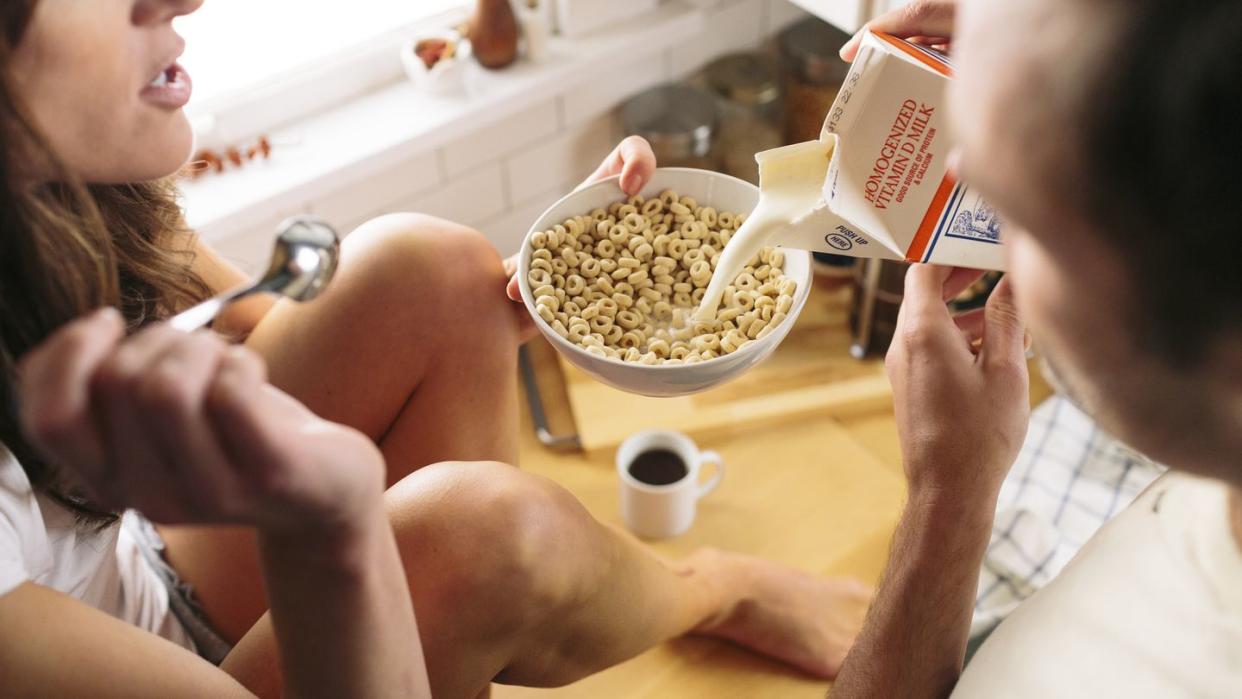Recent Reports Linking Cheerios To Infertility Are Overblown. Here’s Why.

"Hearst Magazines and Yahoo may earn commission or revenue on some items through these links."
You may have been tempted to toss your box of Cheerios after seeing the recent reports that the cereal—along with Quaker Oats—contain a banned chemical that's linked to infertility. But, here's why you should take a beat before completely changing up your breakfast diet.
Indeed, a new study found that chlormequat—a chemical used as a plant growth regulator—was found in 92 percent of oat-based foods purchased in May 2023, including Cheerios and Quaker Oats, per The New York Post. But, the oat samples contained less than a hundredth of the levels that are considered "unsafe," nutrition expert Adrian Chavez, PhD.
"This should have no impact on your day-to-day choices," Chavez tells his followers in a recent Instagram video. "This is another prime example of the media sensationalizing the topic of nutrition and confusing the general public."
This all began on Thursday, when researchers from the Environmental Working Group published a new study in the Journal of Exposure Science & Environmental Epidemiology. After analyzing urine samples collected from three locations around the U.S. at three different time periods between 2017 and 2023, researchers found that chlormequat was detected in 80 percent of the samples; chlormequat, as the study points out, "can lower fertility and harm the developing fetus at doses lower than those used by regulatory agencies to set allowable daily intake levels."
“These findings and chlormequat toxicity data raise concerns about current exposure levels, and warrant more expansive toxicity testing, food monitoring, and epidemiological studies to assess health effects of chlormequat exposures in humans,” the study concludes.
General Mills, the makers of Cheerios, spoke out about the findings, too. "All our products adhere to all regulatory requirements," a spokesperson for General Mills told People. "Food safety is always our top priority at General Mills, and we take care to ensure our food is prepared and packaged in the safest way possible."
Quaker Foods, which makes Quaker Oats, also shared this statement: "At Quaker, we stand by the safety and quality of our products. We have a comprehensive food safety management system in place. We adhere to all regulatory guidelines to ensure the safest, highest quality products for our consumers."
And now, experts like Chavez are saying that these concerns are overblown. Here’s what you need to know.
Chlormequat is used as a plant growth regulator.
Chlormequat is a chloride salt that looks like white crystals and has a fish-like odor, according to the National Library of Medicine. It’s used as a plant growth regulator and is “said to be effective for cereal grains, tomatoes, and peppers,” the agency says. The chemical prevents a plant from bending over, thus making it easier to harvest, according to the Environmental Working Group's study.
The levels found in the study are not toxic to humans.
While plenty of people in the study had chlormequat in their urine, the levels actually weren’t that high. The Environmental Protection Agency allows the chemical to be used on oats and other grains imported to the US, and the study found that participants only tested positive for about 1/100th of the levels considered to be unsafe, per Chavez.
“Urine levels of this pesticide indicate very low levels of exposure and not within levels shown to cause harm,” he explained. “Context and dose matter. The levels of the pesticide detected in the urine are far below orders of magnitude below what is considered safe by the EPA and European Food Safety Authority.”
This was a small study published by an organic foods lobbying group.
With all research, it’s important to know the source and methodology. This particular study was small: The three sample pools included urine from under 100 people.
The study was also conducted by the Environmental Working Group, which is a lobbying group that promotes organic food production.
The study shouldn't affect your breakfast.
Chavez said these findings don't mean you should give up oats or only buy the organic kind (though you do you!). “This should have no impact on your day-to-day choices,” he explained. “This is another prime example of the media sensationalizing the topic of nutrition and confusing the general public.”
You Might Also Like

